ENTREPRENEURSHIP AND SMALL BUSINESS MANAGEMENT: A Tesco Report
VerifiedAdded on 2021/02/20
|11
|3436
|41
Report
AI Summary
This report provides an in-depth analysis of Tesco, examining its entrepreneurial venture within the context of entrepreneurship and small business management. The report begins by defining entrepreneurship and exploring different types of entrepreneurial ventures, such as scalable startups, managed growth ventures, and aggressive growth ventures, while relating them to entrepreneurial typology. It then highlights the differences and similarities between these ventures. The report presents data illustrating the significant impact of small and micro businesses on the UK economy, including job creation and revenue generation. It emphasizes the importance of business startups and small businesses in driving economic growth. Furthermore, the report outlines the traits and characteristics of successful entrepreneurs, differentiating them from managers. It reflects on how an entrepreneur's personality influences their mindset and motivation. The report concludes by discussing how an entrepreneur's background can either hinder or foster their entrepreneurial endeavors. Throughout the report, Tesco serves as a central case study to illustrate these concepts.

ENTREPRENEURSHIP
AND SMALL BUSINESS
MANAGEMENT
AND SMALL BUSINESS
MANAGEMENT
Paraphrase This Document
Need a fresh take? Get an instant paraphrase of this document with our AI Paraphraser
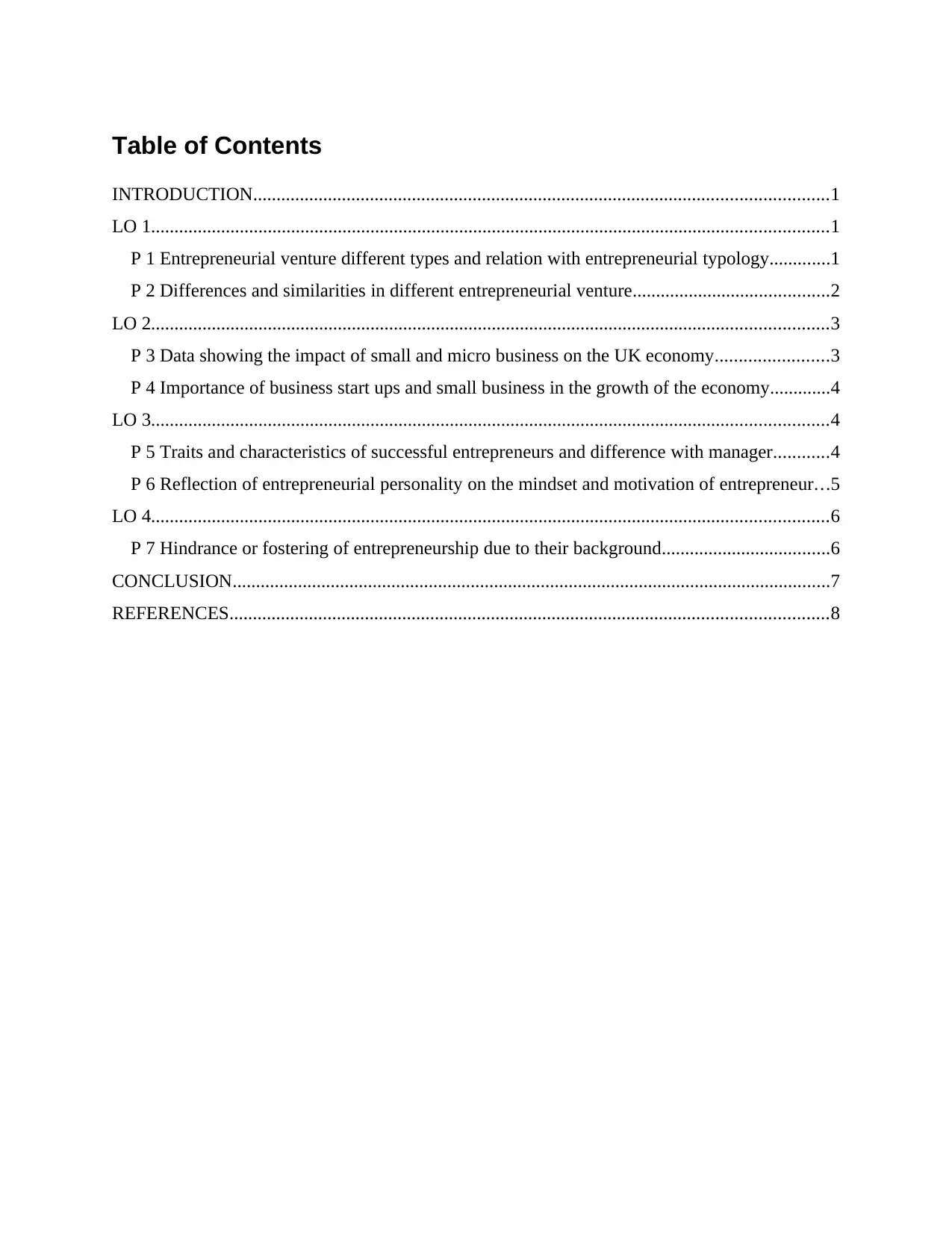
Table of Contents
INTRODUCTION...........................................................................................................................1
LO 1.................................................................................................................................................1
P 1 Entrepreneurial venture different types and relation with entrepreneurial typology.............1
P 2 Differences and similarities in different entrepreneurial venture..........................................2
LO 2.................................................................................................................................................3
P 3 Data showing the impact of small and micro business on the UK economy........................3
P 4 Importance of business start ups and small business in the growth of the economy.............4
LO 3.................................................................................................................................................4
P 5 Traits and characteristics of successful entrepreneurs and difference with manager............4
P 6 Reflection of entrepreneurial personality on the mindset and motivation of entrepreneur...5
LO 4.................................................................................................................................................6
P 7 Hindrance or fostering of entrepreneurship due to their background....................................6
CONCLUSION................................................................................................................................7
REFERENCES................................................................................................................................8
INTRODUCTION...........................................................................................................................1
LO 1.................................................................................................................................................1
P 1 Entrepreneurial venture different types and relation with entrepreneurial typology.............1
P 2 Differences and similarities in different entrepreneurial venture..........................................2
LO 2.................................................................................................................................................3
P 3 Data showing the impact of small and micro business on the UK economy........................3
P 4 Importance of business start ups and small business in the growth of the economy.............4
LO 3.................................................................................................................................................4
P 5 Traits and characteristics of successful entrepreneurs and difference with manager............4
P 6 Reflection of entrepreneurial personality on the mindset and motivation of entrepreneur...5
LO 4.................................................................................................................................................6
P 7 Hindrance or fostering of entrepreneurship due to their background....................................6
CONCLUSION................................................................................................................................7
REFERENCES................................................................................................................................8
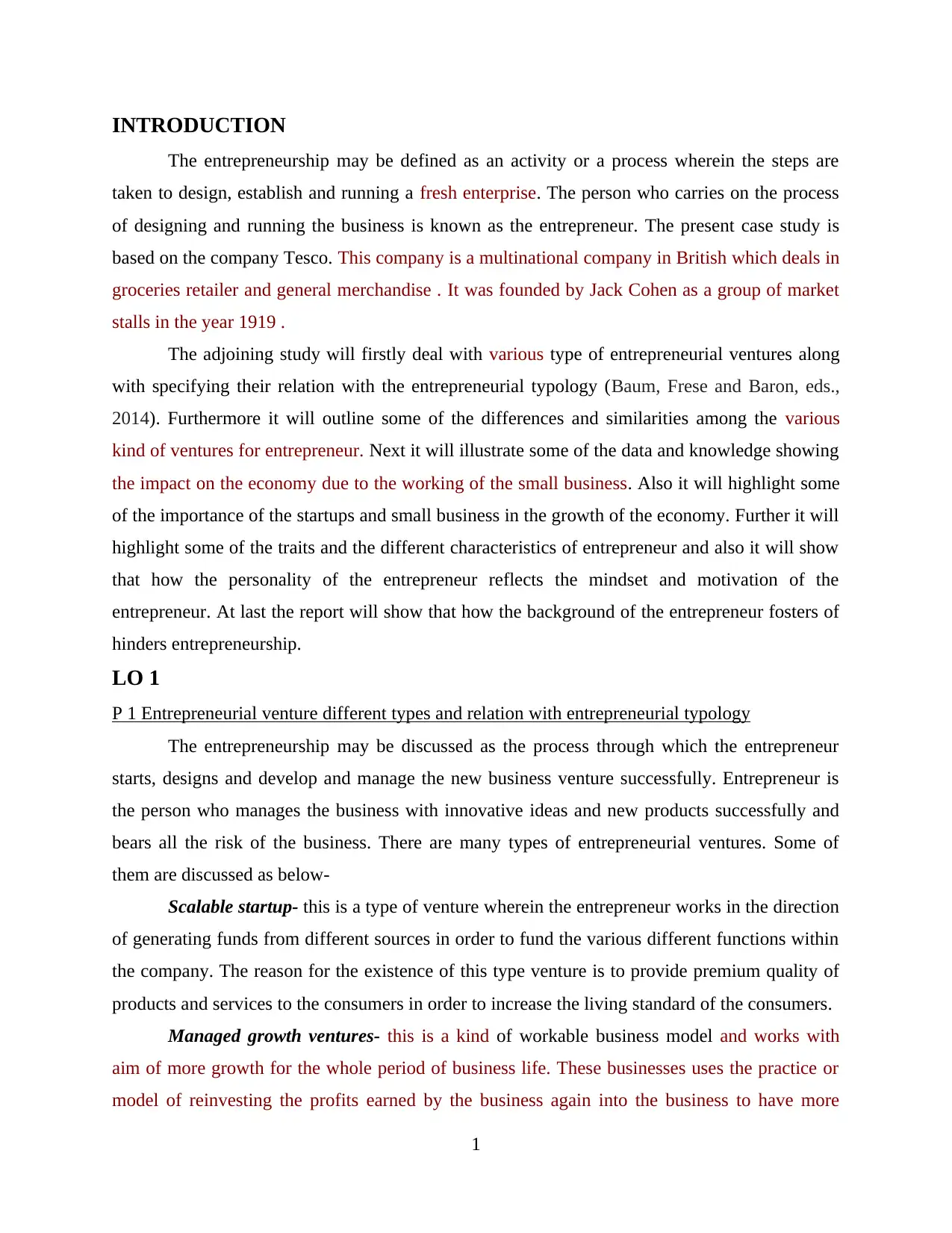
INTRODUCTION
The entrepreneurship may be defined as an activity or a process wherein the steps are
taken to design, establish and running a fresh enterprise. The person who carries on the process
of designing and running the business is known as the entrepreneur. The present case study is
based on the company Tesco. This company is a multinational company in British which deals in
groceries retailer and general merchandise . It was founded by Jack Cohen as a group of market
stalls in the year 1919 .
The adjoining study will firstly deal with various type of entrepreneurial ventures along
with specifying their relation with the entrepreneurial typology (Baum, Frese and Baron, eds.,
2014). Furthermore it will outline some of the differences and similarities among the various
kind of ventures for entrepreneur. Next it will illustrate some of the data and knowledge showing
the impact on the economy due to the working of the small business. Also it will highlight some
of the importance of the startups and small business in the growth of the economy. Further it will
highlight some of the traits and the different characteristics of entrepreneur and also it will show
that how the personality of the entrepreneur reflects the mindset and motivation of the
entrepreneur. At last the report will show that how the background of the entrepreneur fosters of
hinders entrepreneurship.
LO 1
P 1 Entrepreneurial venture different types and relation with entrepreneurial typology
The entrepreneurship may be discussed as the process through which the entrepreneur
starts, designs and develop and manage the new business venture successfully. Entrepreneur is
the person who manages the business with innovative ideas and new products successfully and
bears all the risk of the business. There are many types of entrepreneurial ventures. Some of
them are discussed as below-
Scalable startup- this is a type of venture wherein the entrepreneur works in the direction
of generating funds from different sources in order to fund the various different functions within
the company. The reason for the existence of this type venture is to provide premium quality of
products and services to the consumers in order to increase the living standard of the consumers.
Managed growth ventures- this is a kind of workable business model and works with
aim of more growth for the whole period of business life. These businesses uses the practice or
model of reinvesting the profits earned by the business again into the business to have more
1
The entrepreneurship may be defined as an activity or a process wherein the steps are
taken to design, establish and running a fresh enterprise. The person who carries on the process
of designing and running the business is known as the entrepreneur. The present case study is
based on the company Tesco. This company is a multinational company in British which deals in
groceries retailer and general merchandise . It was founded by Jack Cohen as a group of market
stalls in the year 1919 .
The adjoining study will firstly deal with various type of entrepreneurial ventures along
with specifying their relation with the entrepreneurial typology (Baum, Frese and Baron, eds.,
2014). Furthermore it will outline some of the differences and similarities among the various
kind of ventures for entrepreneur. Next it will illustrate some of the data and knowledge showing
the impact on the economy due to the working of the small business. Also it will highlight some
of the importance of the startups and small business in the growth of the economy. Further it will
highlight some of the traits and the different characteristics of entrepreneur and also it will show
that how the personality of the entrepreneur reflects the mindset and motivation of the
entrepreneur. At last the report will show that how the background of the entrepreneur fosters of
hinders entrepreneurship.
LO 1
P 1 Entrepreneurial venture different types and relation with entrepreneurial typology
The entrepreneurship may be discussed as the process through which the entrepreneur
starts, designs and develop and manage the new business venture successfully. Entrepreneur is
the person who manages the business with innovative ideas and new products successfully and
bears all the risk of the business. There are many types of entrepreneurial ventures. Some of
them are discussed as below-
Scalable startup- this is a type of venture wherein the entrepreneur works in the direction
of generating funds from different sources in order to fund the various different functions within
the company. The reason for the existence of this type venture is to provide premium quality of
products and services to the consumers in order to increase the living standard of the consumers.
Managed growth ventures- this is a kind of workable business model and works with
aim of more growth for the whole period of business life. These businesses uses the practice or
model of reinvesting the profits earned by the business again into the business to have more
1
⊘ This is a preview!⊘
Do you want full access?
Subscribe today to unlock all pages.

Trusted by 1+ million students worldwide
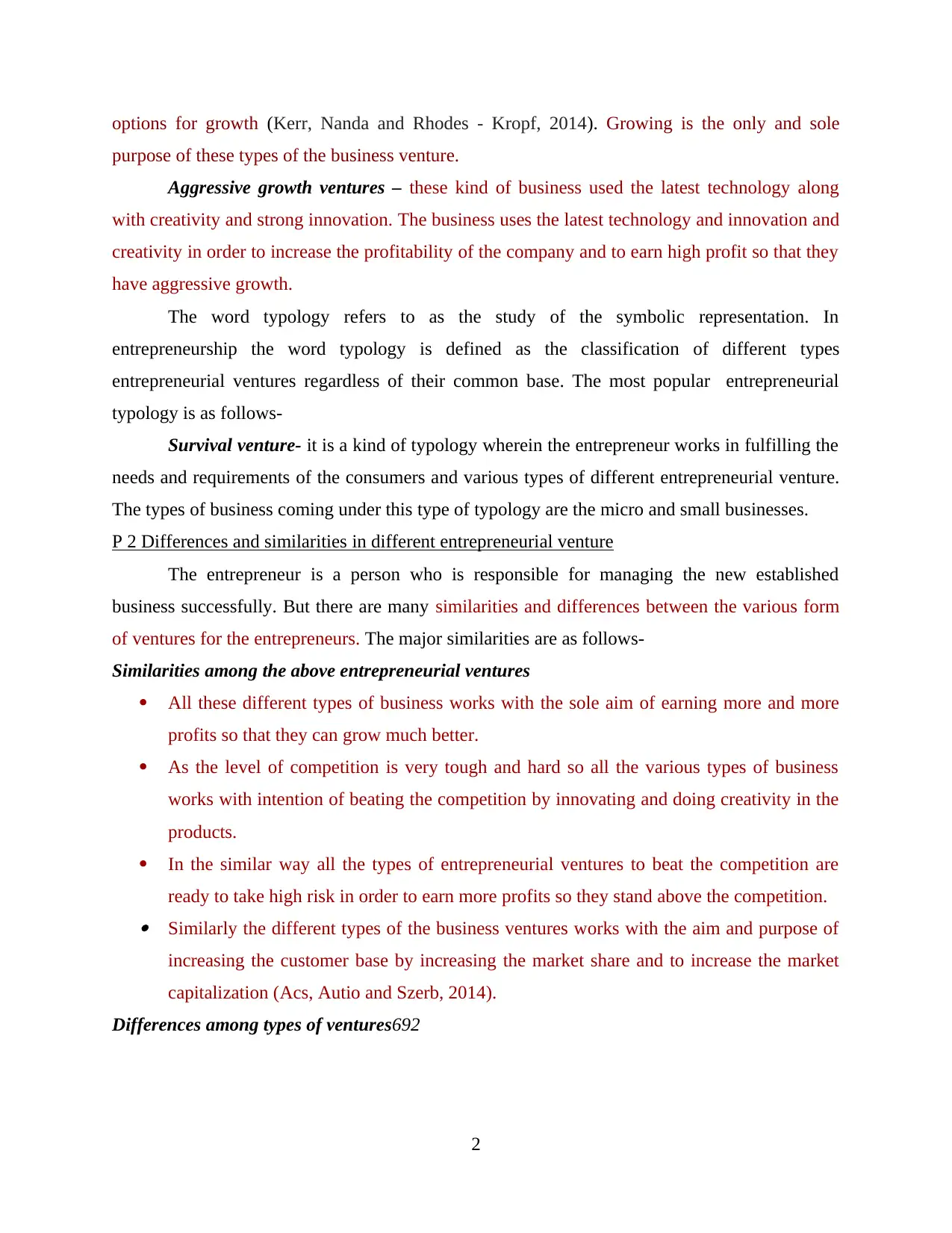
options for growth (Kerr, Nanda and Rhodes - Kropf, 2014). Growing is the only and sole
purpose of these types of the business venture.
Aggressive growth ventures – these kind of business used the latest technology along
with creativity and strong innovation. The business uses the latest technology and innovation and
creativity in order to increase the profitability of the company and to earn high profit so that they
have aggressive growth.
The word typology refers to as the study of the symbolic representation. In
entrepreneurship the word typology is defined as the classification of different types
entrepreneurial ventures regardless of their common base. The most popular entrepreneurial
typology is as follows-
Survival venture- it is a kind of typology wherein the entrepreneur works in fulfilling the
needs and requirements of the consumers and various types of different entrepreneurial venture.
The types of business coming under this type of typology are the micro and small businesses.
P 2 Differences and similarities in different entrepreneurial venture
The entrepreneur is a person who is responsible for managing the new established
business successfully. But there are many similarities and differences between the various form
of ventures for the entrepreneurs. The major similarities are as follows-
Similarities among the above entrepreneurial ventures
All these different types of business works with the sole aim of earning more and more
profits so that they can grow much better.
As the level of competition is very tough and hard so all the various types of business
works with intention of beating the competition by innovating and doing creativity in the
products.
In the similar way all the types of entrepreneurial ventures to beat the competition are
ready to take high risk in order to earn more profits so they stand above the competition. Similarly the different types of the business ventures works with the aim and purpose of
increasing the customer base by increasing the market share and to increase the market
capitalization (Acs, Autio and Szerb, 2014).
Differences among types of ventures692
2
purpose of these types of the business venture.
Aggressive growth ventures – these kind of business used the latest technology along
with creativity and strong innovation. The business uses the latest technology and innovation and
creativity in order to increase the profitability of the company and to earn high profit so that they
have aggressive growth.
The word typology refers to as the study of the symbolic representation. In
entrepreneurship the word typology is defined as the classification of different types
entrepreneurial ventures regardless of their common base. The most popular entrepreneurial
typology is as follows-
Survival venture- it is a kind of typology wherein the entrepreneur works in fulfilling the
needs and requirements of the consumers and various types of different entrepreneurial venture.
The types of business coming under this type of typology are the micro and small businesses.
P 2 Differences and similarities in different entrepreneurial venture
The entrepreneur is a person who is responsible for managing the new established
business successfully. But there are many similarities and differences between the various form
of ventures for the entrepreneurs. The major similarities are as follows-
Similarities among the above entrepreneurial ventures
All these different types of business works with the sole aim of earning more and more
profits so that they can grow much better.
As the level of competition is very tough and hard so all the various types of business
works with intention of beating the competition by innovating and doing creativity in the
products.
In the similar way all the types of entrepreneurial ventures to beat the competition are
ready to take high risk in order to earn more profits so they stand above the competition. Similarly the different types of the business ventures works with the aim and purpose of
increasing the customer base by increasing the market share and to increase the market
capitalization (Acs, Autio and Szerb, 2014).
Differences among types of ventures692
2
Paraphrase This Document
Need a fresh take? Get an instant paraphrase of this document with our AI Paraphraser
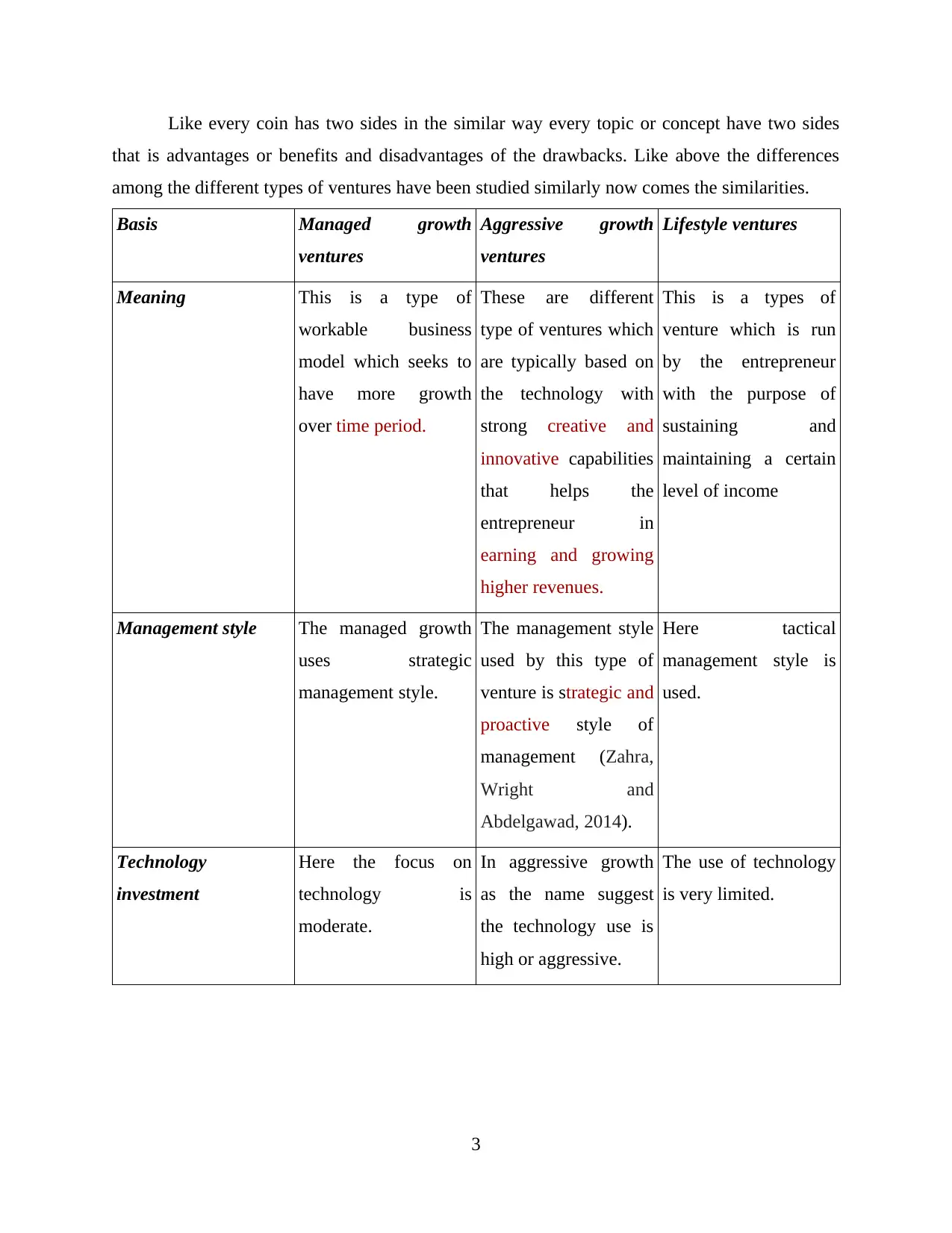
Like every coin has two sides in the similar way every topic or concept have two sides
that is advantages or benefits and disadvantages of the drawbacks. Like above the differences
among the different types of ventures have been studied similarly now comes the similarities.
Basis Managed growth
ventures
Aggressive growth
ventures
Lifestyle ventures
Meaning This is a type of
workable business
model which seeks to
have more growth
over time period.
These are different
type of ventures which
are typically based on
the technology with
strong creative and
innovative capabilities
that helps the
entrepreneur in
earning and growing
higher revenues.
This is a types of
venture which is run
by the entrepreneur
with the purpose of
sustaining and
maintaining a certain
level of income
Management style The managed growth
uses strategic
management style.
The management style
used by this type of
venture is strategic and
proactive style of
management (Zahra,
Wright and
Abdelgawad, 2014).
Here tactical
management style is
used.
Technology
investment
Here the focus on
technology is
moderate.
In aggressive growth
as the name suggest
the technology use is
high or aggressive.
The use of technology
is very limited.
3
that is advantages or benefits and disadvantages of the drawbacks. Like above the differences
among the different types of ventures have been studied similarly now comes the similarities.
Basis Managed growth
ventures
Aggressive growth
ventures
Lifestyle ventures
Meaning This is a type of
workable business
model which seeks to
have more growth
over time period.
These are different
type of ventures which
are typically based on
the technology with
strong creative and
innovative capabilities
that helps the
entrepreneur in
earning and growing
higher revenues.
This is a types of
venture which is run
by the entrepreneur
with the purpose of
sustaining and
maintaining a certain
level of income
Management style The managed growth
uses strategic
management style.
The management style
used by this type of
venture is strategic and
proactive style of
management (Zahra,
Wright and
Abdelgawad, 2014).
Here tactical
management style is
used.
Technology
investment
Here the focus on
technology is
moderate.
In aggressive growth
as the name suggest
the technology use is
high or aggressive.
The use of technology
is very limited.
3
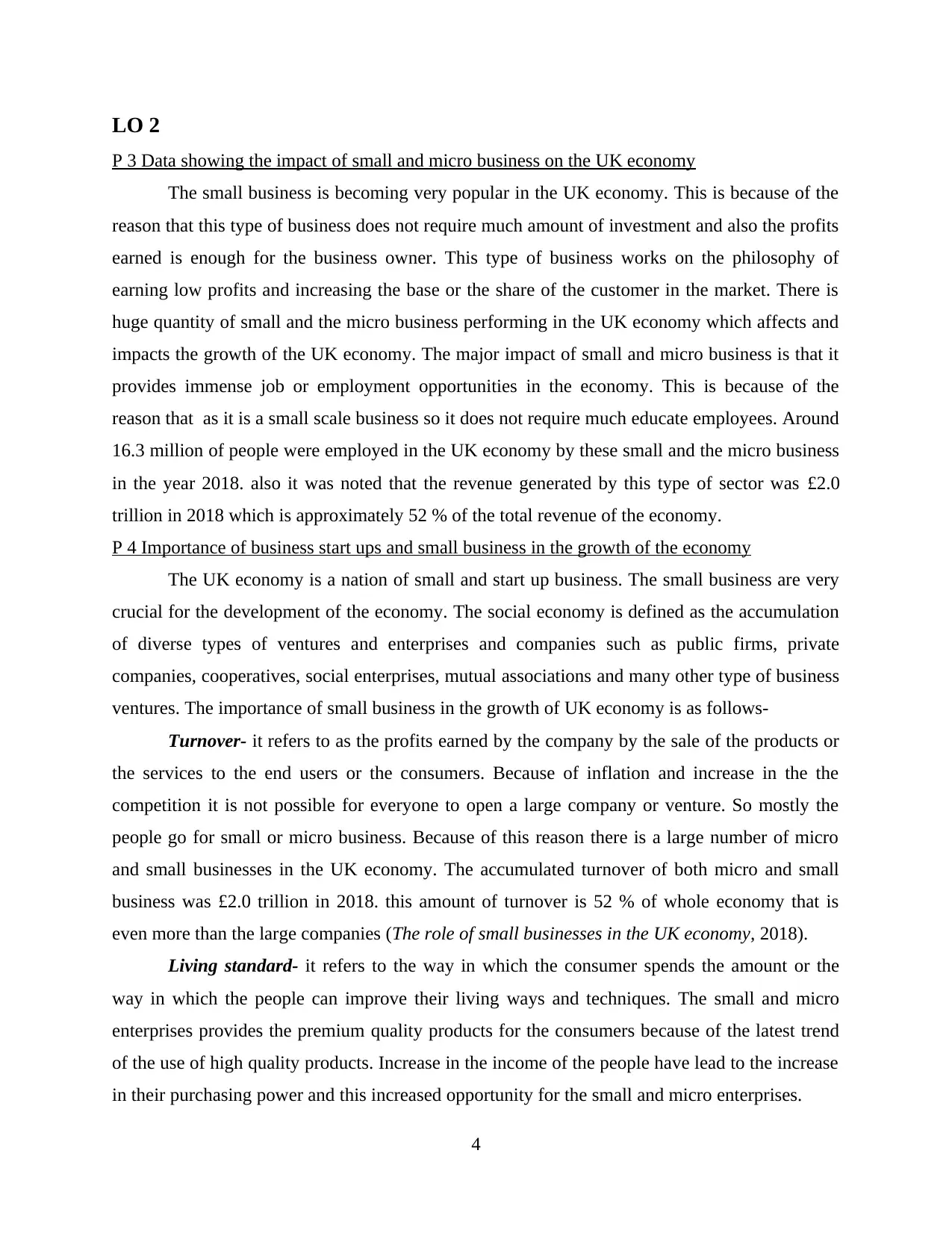
LO 2
P 3 Data showing the impact of small and micro business on the UK economy
The small business is becoming very popular in the UK economy. This is because of the
reason that this type of business does not require much amount of investment and also the profits
earned is enough for the business owner. This type of business works on the philosophy of
earning low profits and increasing the base or the share of the customer in the market. There is
huge quantity of small and the micro business performing in the UK economy which affects and
impacts the growth of the UK economy. The major impact of small and micro business is that it
provides immense job or employment opportunities in the economy. This is because of the
reason that as it is a small scale business so it does not require much educate employees. Around
16.3 million of people were employed in the UK economy by these small and the micro business
in the year 2018. also it was noted that the revenue generated by this type of sector was £2.0
trillion in 2018 which is approximately 52 % of the total revenue of the economy.
P 4 Importance of business start ups and small business in the growth of the economy
The UK economy is a nation of small and start up business. The small business are very
crucial for the development of the economy. The social economy is defined as the accumulation
of diverse types of ventures and enterprises and companies such as public firms, private
companies, cooperatives, social enterprises, mutual associations and many other type of business
ventures. The importance of small business in the growth of UK economy is as follows-
Turnover- it refers to as the profits earned by the company by the sale of the products or
the services to the end users or the consumers. Because of inflation and increase in the the
competition it is not possible for everyone to open a large company or venture. So mostly the
people go for small or micro business. Because of this reason there is a large number of micro
and small businesses in the UK economy. The accumulated turnover of both micro and small
business was £2.0 trillion in 2018. this amount of turnover is 52 % of whole economy that is
even more than the large companies (The role of small businesses in the UK economy, 2018).
Living standard- it refers to the way in which the consumer spends the amount or the
way in which the people can improve their living ways and techniques. The small and micro
enterprises provides the premium quality products for the consumers because of the latest trend
of the use of high quality products. Increase in the income of the people have lead to the increase
in their purchasing power and this increased opportunity for the small and micro enterprises.
4
P 3 Data showing the impact of small and micro business on the UK economy
The small business is becoming very popular in the UK economy. This is because of the
reason that this type of business does not require much amount of investment and also the profits
earned is enough for the business owner. This type of business works on the philosophy of
earning low profits and increasing the base or the share of the customer in the market. There is
huge quantity of small and the micro business performing in the UK economy which affects and
impacts the growth of the UK economy. The major impact of small and micro business is that it
provides immense job or employment opportunities in the economy. This is because of the
reason that as it is a small scale business so it does not require much educate employees. Around
16.3 million of people were employed in the UK economy by these small and the micro business
in the year 2018. also it was noted that the revenue generated by this type of sector was £2.0
trillion in 2018 which is approximately 52 % of the total revenue of the economy.
P 4 Importance of business start ups and small business in the growth of the economy
The UK economy is a nation of small and start up business. The small business are very
crucial for the development of the economy. The social economy is defined as the accumulation
of diverse types of ventures and enterprises and companies such as public firms, private
companies, cooperatives, social enterprises, mutual associations and many other type of business
ventures. The importance of small business in the growth of UK economy is as follows-
Turnover- it refers to as the profits earned by the company by the sale of the products or
the services to the end users or the consumers. Because of inflation and increase in the the
competition it is not possible for everyone to open a large company or venture. So mostly the
people go for small or micro business. Because of this reason there is a large number of micro
and small businesses in the UK economy. The accumulated turnover of both micro and small
business was £2.0 trillion in 2018. this amount of turnover is 52 % of whole economy that is
even more than the large companies (The role of small businesses in the UK economy, 2018).
Living standard- it refers to the way in which the consumer spends the amount or the
way in which the people can improve their living ways and techniques. The small and micro
enterprises provides the premium quality products for the consumers because of the latest trend
of the use of high quality products. Increase in the income of the people have lead to the increase
in their purchasing power and this increased opportunity for the small and micro enterprises.
4
⊘ This is a preview!⊘
Do you want full access?
Subscribe today to unlock all pages.

Trusted by 1+ million students worldwide
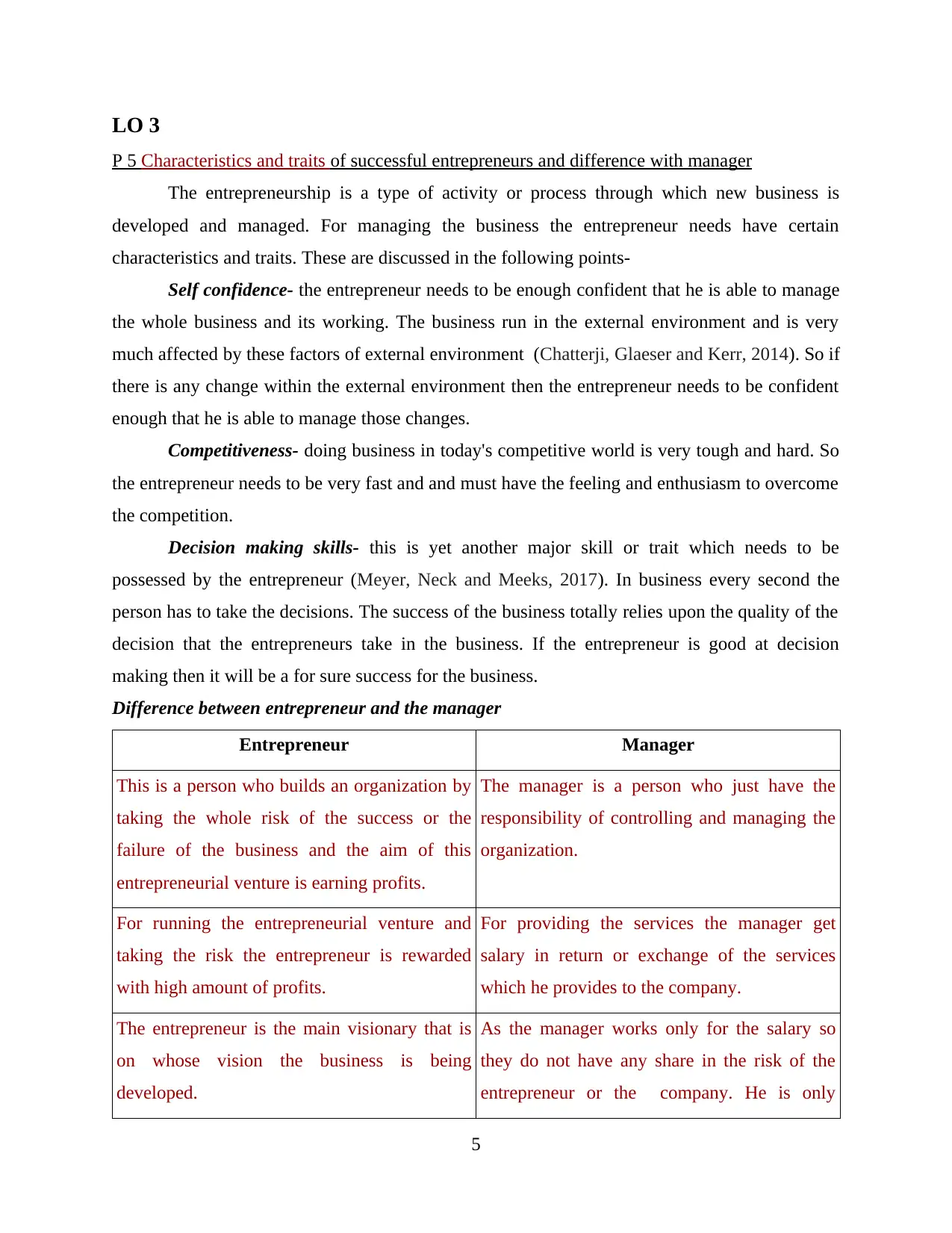
LO 3
P 5 Characteristics and traits of successful entrepreneurs and difference with manager
The entrepreneurship is a type of activity or process through which new business is
developed and managed. For managing the business the entrepreneur needs have certain
characteristics and traits. These are discussed in the following points-
Self confidence- the entrepreneur needs to be enough confident that he is able to manage
the whole business and its working. The business run in the external environment and is very
much affected by these factors of external environment (Chatterji, Glaeser and Kerr, 2014). So if
there is any change within the external environment then the entrepreneur needs to be confident
enough that he is able to manage those changes.
Competitiveness- doing business in today's competitive world is very tough and hard. So
the entrepreneur needs to be very fast and and must have the feeling and enthusiasm to overcome
the competition.
Decision making skills- this is yet another major skill or trait which needs to be
possessed by the entrepreneur (Meyer, Neck and Meeks, 2017). In business every second the
person has to take the decisions. The success of the business totally relies upon the quality of the
decision that the entrepreneurs take in the business. If the entrepreneur is good at decision
making then it will be a for sure success for the business.
Difference between entrepreneur and the manager
Entrepreneur Manager
This is a person who builds an organization by
taking the whole risk of the success or the
failure of the business and the aim of this
entrepreneurial venture is earning profits.
The manager is a person who just have the
responsibility of controlling and managing the
organization.
For running the entrepreneurial venture and
taking the risk the entrepreneur is rewarded
with high amount of profits.
For providing the services the manager get
salary in return or exchange of the services
which he provides to the company.
The entrepreneur is the main visionary that is
on whose vision the business is being
developed.
As the manager works only for the salary so
they do not have any share in the risk of the
entrepreneur or the company. He is only
5
P 5 Characteristics and traits of successful entrepreneurs and difference with manager
The entrepreneurship is a type of activity or process through which new business is
developed and managed. For managing the business the entrepreneur needs have certain
characteristics and traits. These are discussed in the following points-
Self confidence- the entrepreneur needs to be enough confident that he is able to manage
the whole business and its working. The business run in the external environment and is very
much affected by these factors of external environment (Chatterji, Glaeser and Kerr, 2014). So if
there is any change within the external environment then the entrepreneur needs to be confident
enough that he is able to manage those changes.
Competitiveness- doing business in today's competitive world is very tough and hard. So
the entrepreneur needs to be very fast and and must have the feeling and enthusiasm to overcome
the competition.
Decision making skills- this is yet another major skill or trait which needs to be
possessed by the entrepreneur (Meyer, Neck and Meeks, 2017). In business every second the
person has to take the decisions. The success of the business totally relies upon the quality of the
decision that the entrepreneurs take in the business. If the entrepreneur is good at decision
making then it will be a for sure success for the business.
Difference between entrepreneur and the manager
Entrepreneur Manager
This is a person who builds an organization by
taking the whole risk of the success or the
failure of the business and the aim of this
entrepreneurial venture is earning profits.
The manager is a person who just have the
responsibility of controlling and managing the
organization.
For running the entrepreneurial venture and
taking the risk the entrepreneur is rewarded
with high amount of profits.
For providing the services the manager get
salary in return or exchange of the services
which he provides to the company.
The entrepreneur is the main visionary that is
on whose vision the business is being
developed.
As the manager works only for the salary so
they do not have any share in the risk of the
entrepreneur or the company. He is only
5
Paraphrase This Document
Need a fresh take? Get an instant paraphrase of this document with our AI Paraphraser
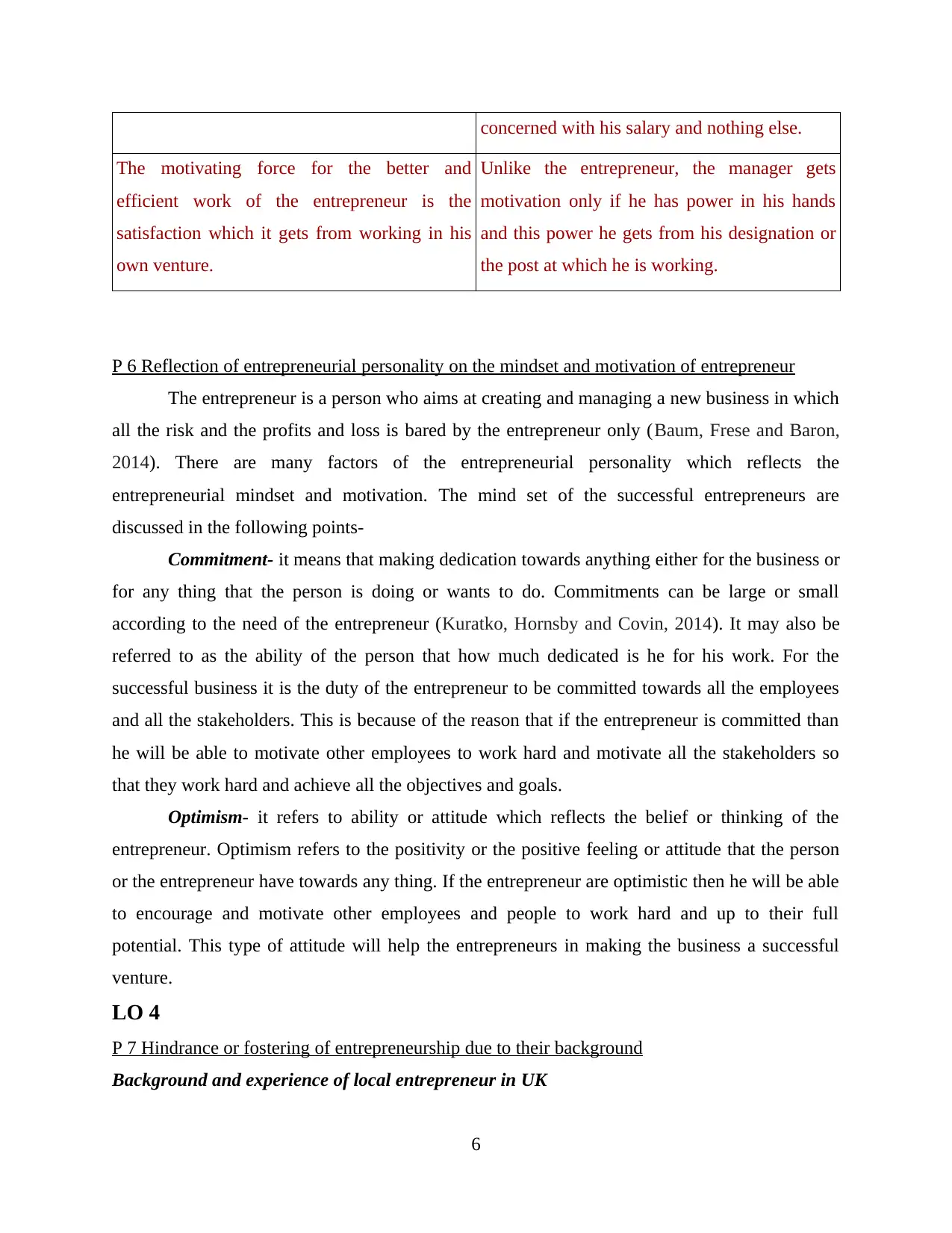
concerned with his salary and nothing else.
The motivating force for the better and
efficient work of the entrepreneur is the
satisfaction which it gets from working in his
own venture.
Unlike the entrepreneur, the manager gets
motivation only if he has power in his hands
and this power he gets from his designation or
the post at which he is working.
P 6 Reflection of entrepreneurial personality on the mindset and motivation of entrepreneur
The entrepreneur is a person who aims at creating and managing a new business in which
all the risk and the profits and loss is bared by the entrepreneur only (Baum, Frese and Baron,
2014). There are many factors of the entrepreneurial personality which reflects the
entrepreneurial mindset and motivation. The mind set of the successful entrepreneurs are
discussed in the following points-
Commitment- it means that making dedication towards anything either for the business or
for any thing that the person is doing or wants to do. Commitments can be large or small
according to the need of the entrepreneur (Kuratko, Hornsby and Covin, 2014). It may also be
referred to as the ability of the person that how much dedicated is he for his work. For the
successful business it is the duty of the entrepreneur to be committed towards all the employees
and all the stakeholders. This is because of the reason that if the entrepreneur is committed than
he will be able to motivate other employees to work hard and motivate all the stakeholders so
that they work hard and achieve all the objectives and goals.
Optimism- it refers to ability or attitude which reflects the belief or thinking of the
entrepreneur. Optimism refers to the positivity or the positive feeling or attitude that the person
or the entrepreneur have towards any thing. If the entrepreneur are optimistic then he will be able
to encourage and motivate other employees and people to work hard and up to their full
potential. This type of attitude will help the entrepreneurs in making the business a successful
venture.
LO 4
P 7 Hindrance or fostering of entrepreneurship due to their background
Background and experience of local entrepreneur in UK
6
The motivating force for the better and
efficient work of the entrepreneur is the
satisfaction which it gets from working in his
own venture.
Unlike the entrepreneur, the manager gets
motivation only if he has power in his hands
and this power he gets from his designation or
the post at which he is working.
P 6 Reflection of entrepreneurial personality on the mindset and motivation of entrepreneur
The entrepreneur is a person who aims at creating and managing a new business in which
all the risk and the profits and loss is bared by the entrepreneur only (Baum, Frese and Baron,
2014). There are many factors of the entrepreneurial personality which reflects the
entrepreneurial mindset and motivation. The mind set of the successful entrepreneurs are
discussed in the following points-
Commitment- it means that making dedication towards anything either for the business or
for any thing that the person is doing or wants to do. Commitments can be large or small
according to the need of the entrepreneur (Kuratko, Hornsby and Covin, 2014). It may also be
referred to as the ability of the person that how much dedicated is he for his work. For the
successful business it is the duty of the entrepreneur to be committed towards all the employees
and all the stakeholders. This is because of the reason that if the entrepreneur is committed than
he will be able to motivate other employees to work hard and motivate all the stakeholders so
that they work hard and achieve all the objectives and goals.
Optimism- it refers to ability or attitude which reflects the belief or thinking of the
entrepreneur. Optimism refers to the positivity or the positive feeling or attitude that the person
or the entrepreneur have towards any thing. If the entrepreneur are optimistic then he will be able
to encourage and motivate other employees and people to work hard and up to their full
potential. This type of attitude will help the entrepreneurs in making the business a successful
venture.
LO 4
P 7 Hindrance or fostering of entrepreneurship due to their background
Background and experience of local entrepreneur in UK
6
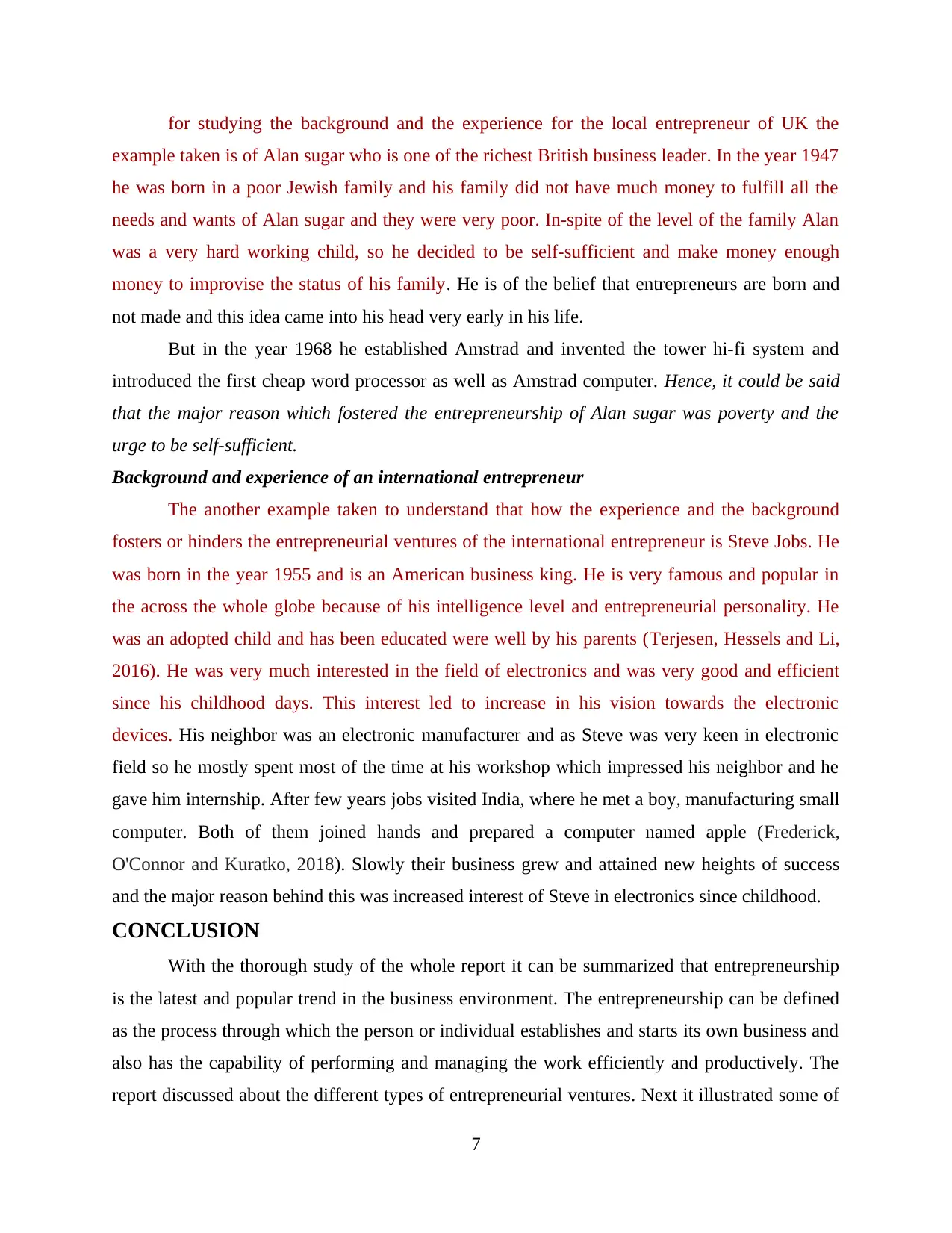
for studying the background and the experience for the local entrepreneur of UK the
example taken is of Alan sugar who is one of the richest British business leader. In the year 1947
he was born in a poor Jewish family and his family did not have much money to fulfill all the
needs and wants of Alan sugar and they were very poor. In-spite of the level of the family Alan
was a very hard working child, so he decided to be self-sufficient and make money enough
money to improvise the status of his family. He is of the belief that entrepreneurs are born and
not made and this idea came into his head very early in his life.
But in the year 1968 he established Amstrad and invented the tower hi-fi system and
introduced the first cheap word processor as well as Amstrad computer. Hence, it could be said
that the major reason which fostered the entrepreneurship of Alan sugar was poverty and the
urge to be self-sufficient.
Background and experience of an international entrepreneur
The another example taken to understand that how the experience and the background
fosters or hinders the entrepreneurial ventures of the international entrepreneur is Steve Jobs. He
was born in the year 1955 and is an American business king. He is very famous and popular in
the across the whole globe because of his intelligence level and entrepreneurial personality. He
was an adopted child and has been educated were well by his parents (Terjesen, Hessels and Li,
2016). He was very much interested in the field of electronics and was very good and efficient
since his childhood days. This interest led to increase in his vision towards the electronic
devices. His neighbor was an electronic manufacturer and as Steve was very keen in electronic
field so he mostly spent most of the time at his workshop which impressed his neighbor and he
gave him internship. After few years jobs visited India, where he met a boy, manufacturing small
computer. Both of them joined hands and prepared a computer named apple (Frederick,
O'Connor and Kuratko, 2018). Slowly their business grew and attained new heights of success
and the major reason behind this was increased interest of Steve in electronics since childhood.
CONCLUSION
With the thorough study of the whole report it can be summarized that entrepreneurship
is the latest and popular trend in the business environment. The entrepreneurship can be defined
as the process through which the person or individual establishes and starts its own business and
also has the capability of performing and managing the work efficiently and productively. The
report discussed about the different types of entrepreneurial ventures. Next it illustrated some of
7
example taken is of Alan sugar who is one of the richest British business leader. In the year 1947
he was born in a poor Jewish family and his family did not have much money to fulfill all the
needs and wants of Alan sugar and they were very poor. In-spite of the level of the family Alan
was a very hard working child, so he decided to be self-sufficient and make money enough
money to improvise the status of his family. He is of the belief that entrepreneurs are born and
not made and this idea came into his head very early in his life.
But in the year 1968 he established Amstrad and invented the tower hi-fi system and
introduced the first cheap word processor as well as Amstrad computer. Hence, it could be said
that the major reason which fostered the entrepreneurship of Alan sugar was poverty and the
urge to be self-sufficient.
Background and experience of an international entrepreneur
The another example taken to understand that how the experience and the background
fosters or hinders the entrepreneurial ventures of the international entrepreneur is Steve Jobs. He
was born in the year 1955 and is an American business king. He is very famous and popular in
the across the whole globe because of his intelligence level and entrepreneurial personality. He
was an adopted child and has been educated were well by his parents (Terjesen, Hessels and Li,
2016). He was very much interested in the field of electronics and was very good and efficient
since his childhood days. This interest led to increase in his vision towards the electronic
devices. His neighbor was an electronic manufacturer and as Steve was very keen in electronic
field so he mostly spent most of the time at his workshop which impressed his neighbor and he
gave him internship. After few years jobs visited India, where he met a boy, manufacturing small
computer. Both of them joined hands and prepared a computer named apple (Frederick,
O'Connor and Kuratko, 2018). Slowly their business grew and attained new heights of success
and the major reason behind this was increased interest of Steve in electronics since childhood.
CONCLUSION
With the thorough study of the whole report it can be summarized that entrepreneurship
is the latest and popular trend in the business environment. The entrepreneurship can be defined
as the process through which the person or individual establishes and starts its own business and
also has the capability of performing and managing the work efficiently and productively. The
report discussed about the different types of entrepreneurial ventures. Next it illustrated some of
7
⊘ This is a preview!⊘
Do you want full access?
Subscribe today to unlock all pages.

Trusted by 1+ million students worldwide
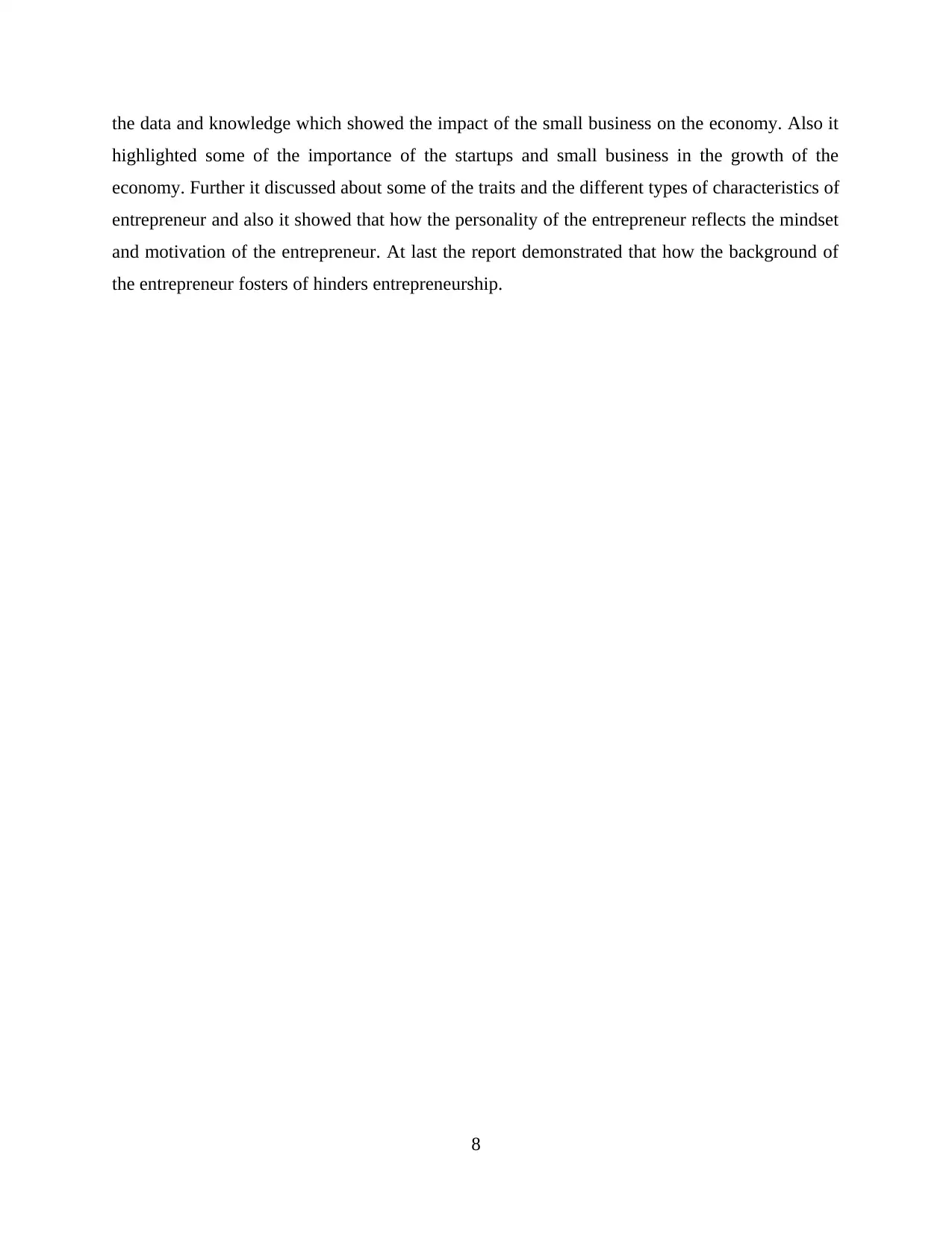
the data and knowledge which showed the impact of the small business on the economy. Also it
highlighted some of the importance of the startups and small business in the growth of the
economy. Further it discussed about some of the traits and the different types of characteristics of
entrepreneur and also it showed that how the personality of the entrepreneur reflects the mindset
and motivation of the entrepreneur. At last the report demonstrated that how the background of
the entrepreneur fosters of hinders entrepreneurship.
8
highlighted some of the importance of the startups and small business in the growth of the
economy. Further it discussed about some of the traits and the different types of characteristics of
entrepreneur and also it showed that how the personality of the entrepreneur reflects the mindset
and motivation of the entrepreneur. At last the report demonstrated that how the background of
the entrepreneur fosters of hinders entrepreneurship.
8
Paraphrase This Document
Need a fresh take? Get an instant paraphrase of this document with our AI Paraphraser
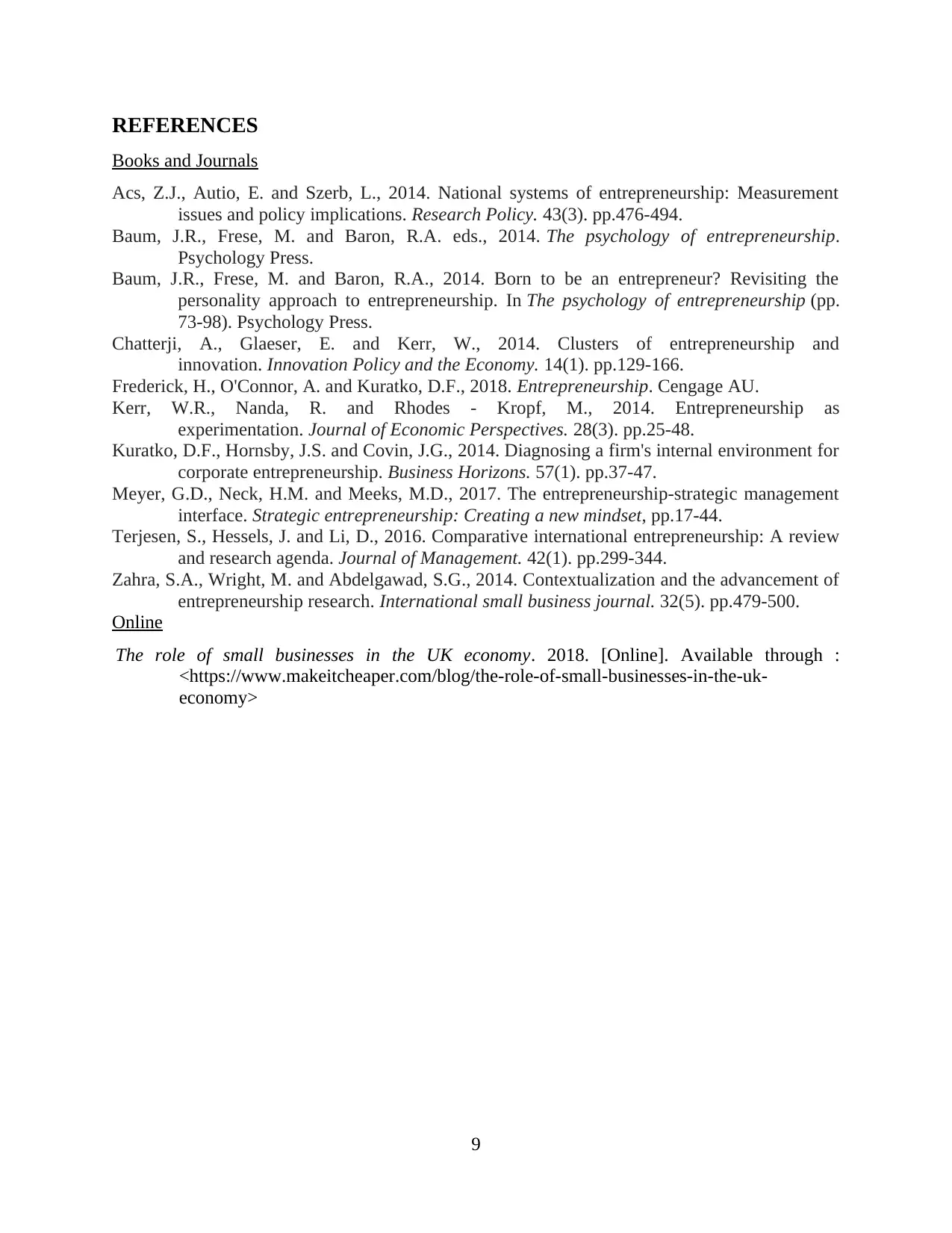
REFERENCES
Books and Journals
Acs, Z.J., Autio, E. and Szerb, L., 2014. National systems of entrepreneurship: Measurement
issues and policy implications. Research Policy. 43(3). pp.476-494.
Baum, J.R., Frese, M. and Baron, R.A. eds., 2014. The psychology of entrepreneurship.
Psychology Press.
Baum, J.R., Frese, M. and Baron, R.A., 2014. Born to be an entrepreneur? Revisiting the
personality approach to entrepreneurship. In The psychology of entrepreneurship (pp.
73-98). Psychology Press.
Chatterji, A., Glaeser, E. and Kerr, W., 2014. Clusters of entrepreneurship and
innovation. Innovation Policy and the Economy. 14(1). pp.129-166.
Frederick, H., O'Connor, A. and Kuratko, D.F., 2018. Entrepreneurship. Cengage AU.
Kerr, W.R., Nanda, R. and Rhodes - Kropf, M., 2014. Entrepreneurship as
experimentation. Journal of Economic Perspectives. 28(3). pp.25-48.
Kuratko, D.F., Hornsby, J.S. and Covin, J.G., 2014. Diagnosing a firm's internal environment for
corporate entrepreneurship. Business Horizons. 57(1). pp.37-47.
Meyer, G.D., Neck, H.M. and Meeks, M.D., 2017. The entrepreneurship‐strategic management
interface. Strategic entrepreneurship: Creating a new mindset, pp.17-44.
Terjesen, S., Hessels, J. and Li, D., 2016. Comparative international entrepreneurship: A review
and research agenda. Journal of Management. 42(1). pp.299-344.
Zahra, S.A., Wright, M. and Abdelgawad, S.G., 2014. Contextualization and the advancement of
entrepreneurship research. International small business journal. 32(5). pp.479-500.
Online
The role of small businesses in the UK economy. 2018. [Online]. Available through :
<https://www.makeitcheaper.com/blog/the-role-of-small-businesses-in-the-uk-
economy>
9
Books and Journals
Acs, Z.J., Autio, E. and Szerb, L., 2014. National systems of entrepreneurship: Measurement
issues and policy implications. Research Policy. 43(3). pp.476-494.
Baum, J.R., Frese, M. and Baron, R.A. eds., 2014. The psychology of entrepreneurship.
Psychology Press.
Baum, J.R., Frese, M. and Baron, R.A., 2014. Born to be an entrepreneur? Revisiting the
personality approach to entrepreneurship. In The psychology of entrepreneurship (pp.
73-98). Psychology Press.
Chatterji, A., Glaeser, E. and Kerr, W., 2014. Clusters of entrepreneurship and
innovation. Innovation Policy and the Economy. 14(1). pp.129-166.
Frederick, H., O'Connor, A. and Kuratko, D.F., 2018. Entrepreneurship. Cengage AU.
Kerr, W.R., Nanda, R. and Rhodes - Kropf, M., 2014. Entrepreneurship as
experimentation. Journal of Economic Perspectives. 28(3). pp.25-48.
Kuratko, D.F., Hornsby, J.S. and Covin, J.G., 2014. Diagnosing a firm's internal environment for
corporate entrepreneurship. Business Horizons. 57(1). pp.37-47.
Meyer, G.D., Neck, H.M. and Meeks, M.D., 2017. The entrepreneurship‐strategic management
interface. Strategic entrepreneurship: Creating a new mindset, pp.17-44.
Terjesen, S., Hessels, J. and Li, D., 2016. Comparative international entrepreneurship: A review
and research agenda. Journal of Management. 42(1). pp.299-344.
Zahra, S.A., Wright, M. and Abdelgawad, S.G., 2014. Contextualization and the advancement of
entrepreneurship research. International small business journal. 32(5). pp.479-500.
Online
The role of small businesses in the UK economy. 2018. [Online]. Available through :
<https://www.makeitcheaper.com/blog/the-role-of-small-businesses-in-the-uk-
economy>
9
1 out of 11
Related Documents
Your All-in-One AI-Powered Toolkit for Academic Success.
+13062052269
info@desklib.com
Available 24*7 on WhatsApp / Email
![[object Object]](/_next/static/media/star-bottom.7253800d.svg)
Unlock your academic potential
Copyright © 2020–2026 A2Z Services. All Rights Reserved. Developed and managed by ZUCOL.





